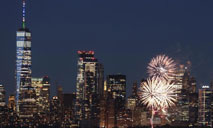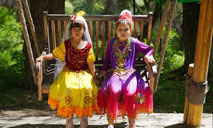West humiliates self with Xinjiang smears at UN human rights session
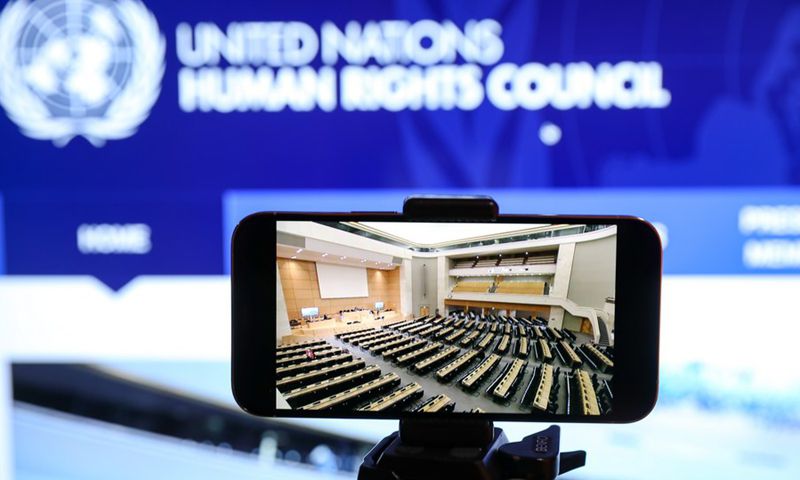
Photo taken on Feb. 22, 2021 in Brussels, Belgium shows a screen displaying the 46th session of the United Nations Human Rights Council (UNHRC) held in Geneva, Switzerland.(Photo: Xinhua)
The battles centering on China's human rights record especially on its Xinjiang Uygur Autonomous Region have been extended to the 47th session of the United Nations Human Rights Council (UNHRC) which opened on Monday.
Having no legal basis or evidence, a small group of Western countries - led by Canada, the US and the UK, were determined to continue the groundless "genocide" allegations against China, a move that analysts said only humiliates themselves considering their own notorious record of race genocide.
On Monday, Michelle Bachelet, UN High Commissioner for Human Rights, also issued a statement, in which she mentioned topics on China's Hong Kong and Xinjiang region and claimed that they have been closely monitoring the application of the National Security Law in Hong Kong and "the chilling impact" it had on the civic and democratic space.
On Xinjiang, she said that she continues to discuss with China modalities for a visit, including meaningful access, to the Xinjiang region, and hopes "this can be achieved this year."
In response to Bachelet's remarks, Liu Yuyin, spokesperson for the Chinese Mission to the United Nations Office at Geneva, said in a statement on Monday that Hong Kong and Xinjiang are inalienable parts of China's territory. Hong Kong and Xinjiang related issues are China's internal affairs which brook no interference by any external forces.
The High Commissioner for Human Rights is urged to respect facts, see through the political attempts of the anti-China forces and act in a just and objective manner. The High Commissioner is advised to stop making erroneous remarks against China, and refrain from interfering in China's sovereignty and judicial independence, said Liu.
Bachelet's remarks, which promotes a particular point of view, have also shown how severely people living in the West have been poisoned by fake news and rumors from Western media against China, Wang Yu, an associate professor from the Institute of Chinese Borderland Studies of the Chinese Academy of Social Sciences, told the Global Times.
Wang noted that a trip to China may help dismiss Bachelet's misunderstanding on China's Hong Kong and Xinjiang.
Ambassador Chen Xu,China's Permanent Representative to the UN Office at Geneva and other International Organizations in Switzerland, said previously that China welcomes the visit of the UN High Commissioner for Human Rights to China, including Xinjiang. The two sides are in communication on this matter. This will be a friendly visit rather than the so-call "investigation" under the presumption of guilt. "We firmly oppose anyone using this matter for political manipulation and exerting pressure on China."
The Monday agenda for the 47th session of the UNHRC was about the annual report of the UN High Commissioner for Human Rights and also the High Commissioner's report on the states' response to the COVID-19 pandemics, according to the website of the UNHRC.
Although nothing was mentioned about China's Xinjiang region in the agenda, Canada planned to lead an "international alliance"of more than 20 countries, including Canada's G7 partners and Sweden, Switzerland, the Netherlands, Australia and New Zealand, to make a joint statement on China's Xinjiang on Monday, CBC News reported.
Analysts said compared with the groundless accusations against China, more attention should be paid to discussions on the first day of the new UNHRC session over pandemic-related issues, given its enduring shock to the world.
According to the draft of the joint statement seen by CBC News, it said that these countries were "gravely concerned about the human rights situation" in the Xinjiang region and demand China allow "meaningful and unfettered access" to investigate "credible reports" of widespread "human rights violations" against China's Muslims. It also expressed "concerns" on issues of Hong Kong and Tibet regions.
"Out of political concerns, Canada and a small group of Western countries crammed topics on China's Xinjiang in the UNHRC agenda, and this is not the first time for them to play the tricks - misusing UN platforms to hype Xinjiang topics without even considering more urgent global concerns," Wang Jiang, a distinguished research fellow at the Institute for Frontier Region of China of Zhejiang Normal University, told the Global Times on Monday.
Wang Jiang attended the 44th session of the UNHRC in June 2020 as a Chinese speaker and talked about China's social relief measures. He pointed out that in recent years, Western countries led by the US had ramped up efforts to attack China on human rights topics, especially on topics of Xinjiang.
"Before China completed its third Universal Periodic Review at the UNHRC in March 2019, the West attacked China on human rights issues… Even though the US had withdrawn from the UNHRC in June 2018, it was behind many political farces made by the West targeting China," Wang said.
Wang Jiang noted that the US may lead a fiercer anti-China campaign at the UNHRC this year since it has returned to the UN human rights body and is wielding its money and influence to oppress China. Overseas separatist groups and anti-China forces are also working hard to keep the "fever" of the topics on Xinjiang to ensure rolling coverage on Western media--for example, by hyping the pseudo-court, the Uyghur Tribunal.
The Biden administration announced the US' return to the UNHRC in February 2020 as an observer, reversing former President Donald Trump's decision to withdraw from the body in June 2018.
Although the planned joint statement was led by Canada, the US is also behind it. On Friday, Chinese Foreign Ministry spokesperson Zhao Lijian called it another "political farce" staged by Canada, the US and the UK.
Even during its absence, the US had also been engaged in several joint statements made by Western countries against China. But each time, they were slammed by more countries that expressed support for China.
For example, in March during the 46th session of the UNHRC, on behalf of 64 countries, Cuba delivered a joint statement to express support to China's policies in its Xinjiang regions. In contrast, on March 22, the US State Department released a statement jointly made by Canada, the UK and the US, expressing concerns over Muslims in China's Xinjiang region.
Similar battles have been seen at the UNHRC, and each time, more than 50 countries stood out to support China while the number of West countries that attacked China remained small, Wang said, noting that the sharp contrast on the numbers of each group displayed the difference of understanding human rights between US-led Western countries and the majority of developing countries.
To better fight back the smear campaign against China, more Chinese experts and nongovernmental organizations came to attend sideline activities of the UNHRC. The Global Times learned that Chinese NGOs, including the China Society for Human Rights Studies, organized six online forums and invited experts from many countries, including Germany, Russia, Nepal and South Africa to communicate with Chinese experts and residents from China's Xinjiang.
West's notorious record
Using the excuse of human rights, the US and the West have hyped Xinjiang topics and so-called "genocide" allegations, but their purpose on using Xinjiang topics to contain China has fully been exposed together with their hypocrisy and double standards on human rights, said Wang Yu.
Wang Yu attended the 46th session in February 2021 and spoke on the US' infamous record on human rights. He said that US discrimination against Muslims has bankrupted its "concerns" for Muslims in China.
According to a survey released by the Pew Research Center in 2017, 74 percent of Muslim respondents said there is a lot of discrimination against Muslims in the US.
The number of anti-Muslim hate groups in the US had nearly tripled since Trump launched his presidential campaign in 2015, the Southern Poverty Law Center said in a report in 2017.
Trump's signing of the Muslim ban in January 2017 had also deprived US Muslims' rights on religion exchanges or visiting relatives, Wang said, noting that even if President Joe Biden has overturned the ban, his administration cannot wipe out its negative influence.
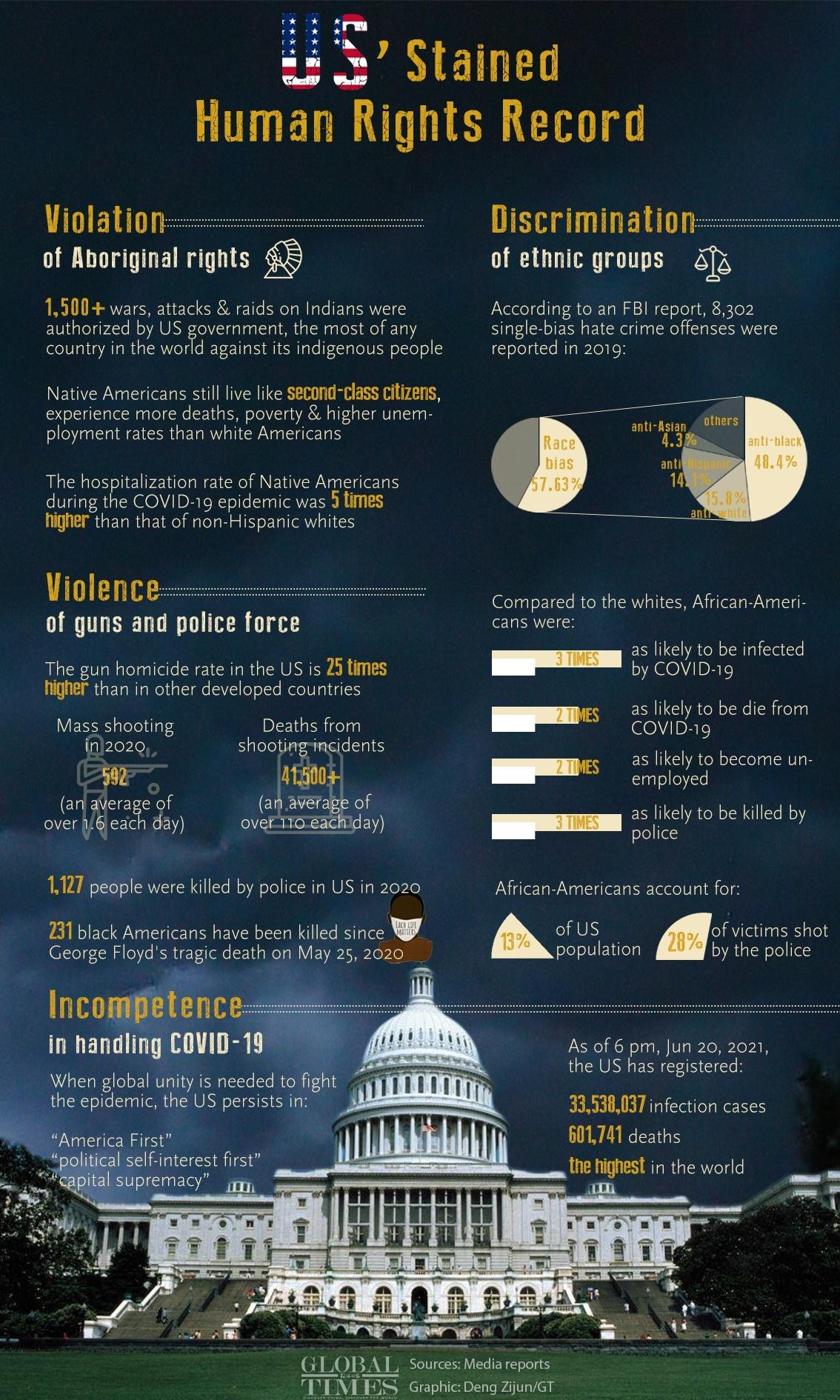
US' Stained Human Rights Record Graphic: Deng Zijun/GT
Aside from the US, the UK and Canada also have notorious race genocide records, and it is shameless for them to make groundless "genocide" allegations against China, Wang said.
Some members of parliament in Canada blasted Canada as a racist and hypocritical failure and as a country built on the oppression of indigenous people, and whose history is "stained with blood," The Globe and Mail reported on June 16.
The remains of 215 children, some as young as 3 years old, have been found buried on the site of what was once Canada's largest Indigenous residential school — one of the institutions that held children taken from families across the nation, Canadian media reported, making it the latest evidence of the country's culture genocide of indigenous people.
Experts said that the bloody atrocities committed against indigenous peoples that were once buried in the dustbin of history have been uncovered one by one. Western countries played the human rights card with the help of their dominance in public opinion, but their evil past cannot be buried and has exposed their hypocrisy on human rights.
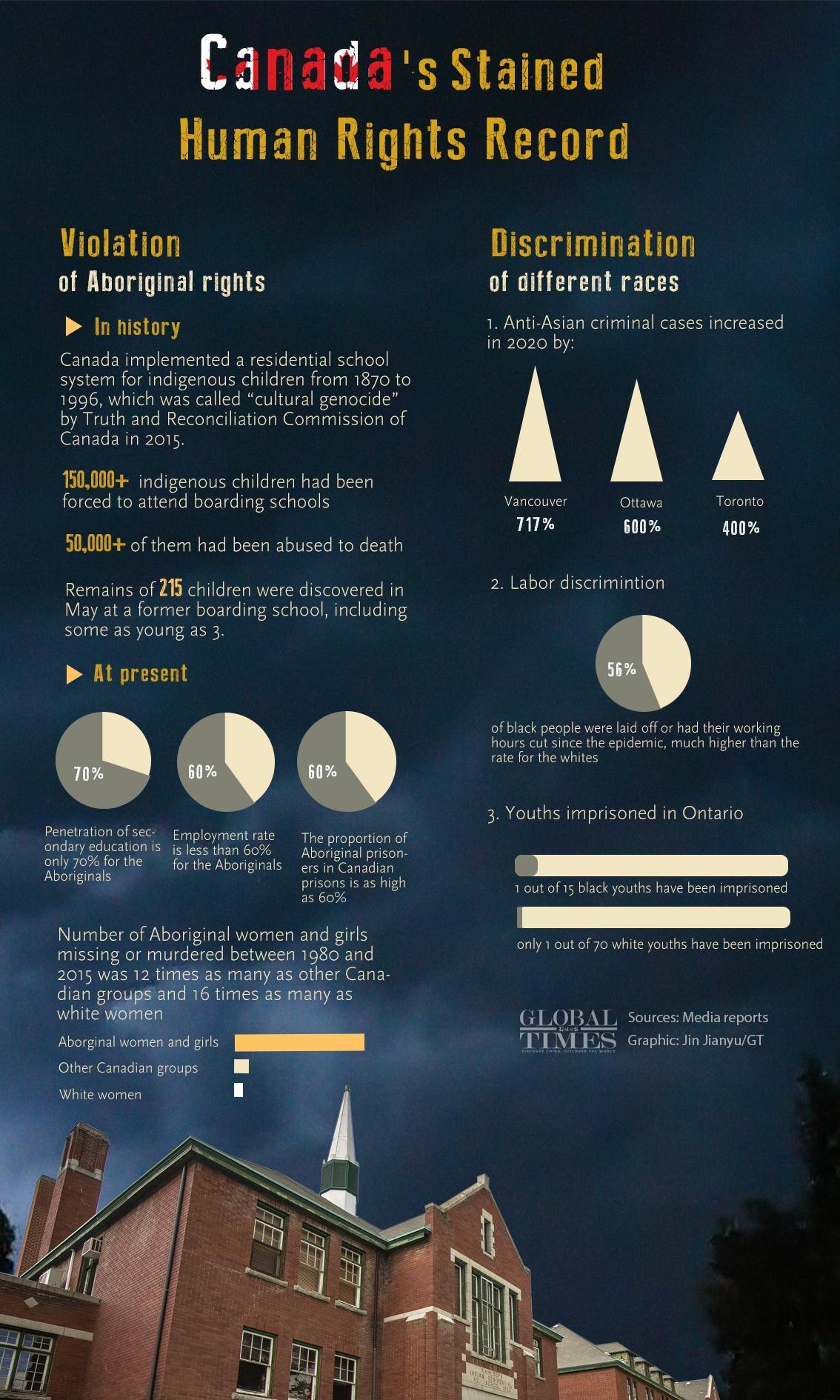
Canada's Stained Human Rights Record. Graphic: Jin Jianyu
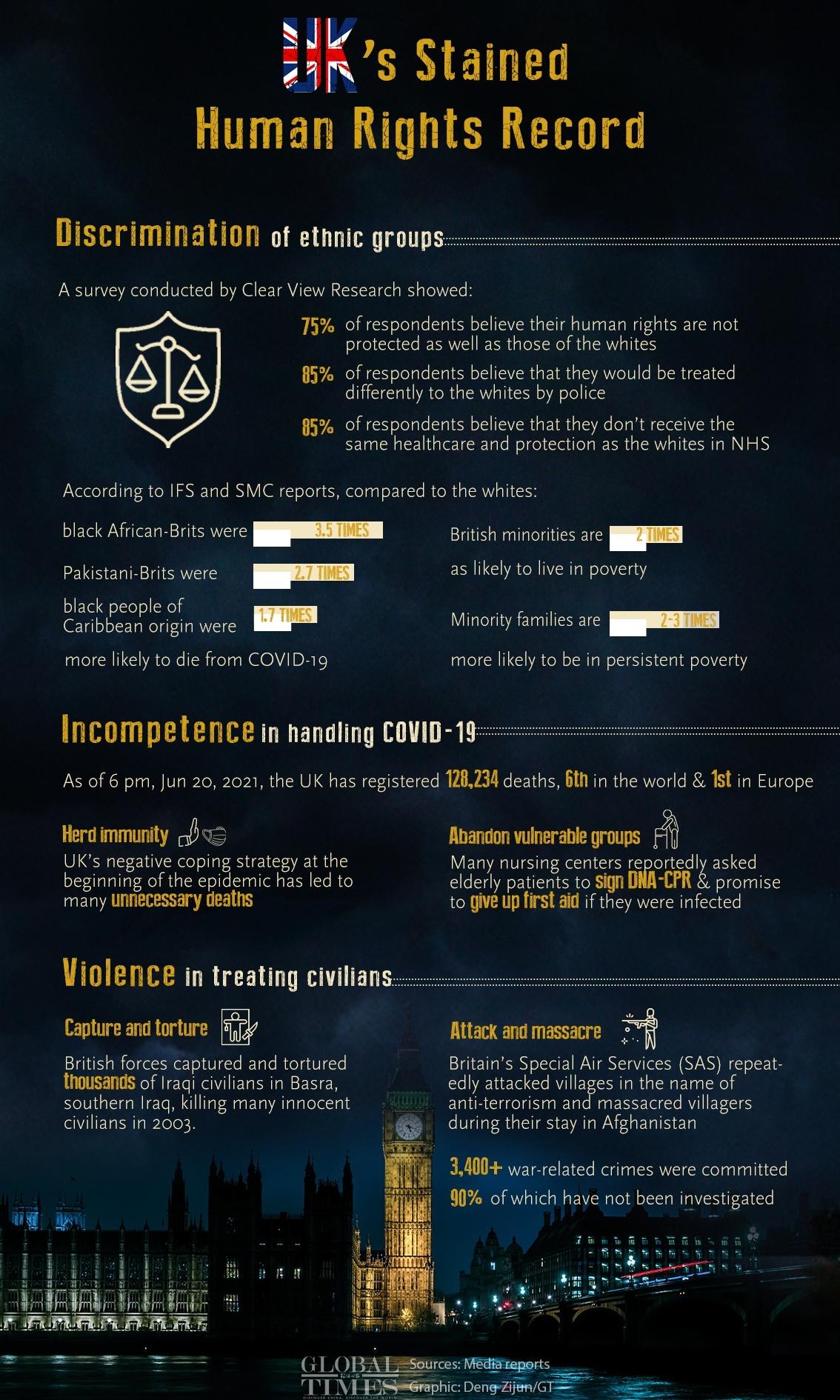
UK's Stained Human Rights Record Graphic: Deng Zijun/GT
Photos
Related Stories
Copyright © 2021 People's Daily Online. All Rights Reserved.








